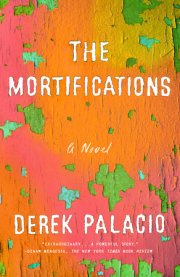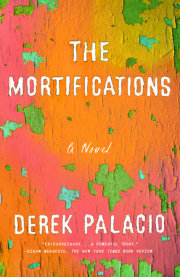9781101905692|excerpt
Palacio / THE MORTIFICATIONS
the land
Ulises Encarnación did not believe in fate. This may have been a by-product of the sailor’s name his father, Uxbal, had given him and the fact that Ulises detested ocean horizons—they were impermanent and appeared like waterfalls over which one could cascade into death. More likely his disbelief was a consequence of how Ulises was taken from Cuba as a young boy by his mother, Soledad, as a member of the now-infamous 1980 Mariel Boatlift. Uxbal had wanted the family to stay despite their poverty. They did have a sturdy house with a garden, tomatoes when others didn’t, but Soledad saw in Ulises a mind for school, and she worried about the state of young, pensive boys in Cuba. Bookworms were considered faggots, and though she did not think her son a homosexual, the state might, and she cringed at the thought of him in prison or, worse, at a rehabilitation camp.
There was also Ulises’s twin sister, Isabel—or Izzi, as they sometimes called her—a young girl who sang in church, which could be done anywhere, and who seemed unattached to Buey Arriba, meaning, she might not remember much of Cuba if the family left right then. Soledad preferred to wrench two children out of one culture and into another before the Soviet Union collapsed, which she wrongly predicted would happen in 1985. Uxbal warned them they would not find a home so nice in the States. Kingdoms, he said, are hard to come by. He was so certain of his position that he’d tried holding his daughter ransom, locking Isabel inside the country house with him. Soledad was able to retrieve the girl only by holding Ulises hostage in return. Sewing shears in hand and pressed to her son’s jugular, Soledad swore to Uxbal that unless Isabel walked out the front door, suitcase in hand, his bloodline would die.
It was then, at the age of twelve, that Ulises learned there were no goddesses of the loom, that people could not be, simultaneously, vessels of fate and free will. Destiny was a consequence of irreparable action and, in the case of his childhood relocation, his determined mother’s forced evacuation. Outside their country house she’d whispered in his ear not to worry, but there was a blade against his neck, and why would his father have slipped Isabel so quickly out the door if Soledad had not been serious? Aboard an overcrowded lobster boat, hunched against the back of a car thief and wedged between his mother and sister, Ulises immigrated to the United States, rubbing his throat the entire time. He felt close to dying then, not sure he could trust his mother anymore, and he would forever associate that fear with the farthest stretch of water he could see over the hull of a boat looking north of Cuba, where he saw nothing but more water.
It surprised Ulises that from Miami they took a train north to what the Americans called New England. Soledad’s distant cousins lived in Miami, close to Sunny Isles, and he assumed they would make a large, loud Cuban family together. This was Ulises’s second train ride, the first the journey from Buey Arriba to Havana. Uxbal had once told his son a story about his own first train ride, from the farmland hills of the Sierra Maestra to the southeastern coast: a little black boy had been seated on the bench in front of Uxbal, and Ulises’s father had never seen such hair before. He was five, the boy perhaps the same age, and Uxbal did not hesitate to reach over the bench and touch the tiny curls. He was mesmerized. The black boy shouted, though, and the mothers stood and grabbed for their children. Ulises’s grandmother took Uxbal into her arms, from which perch Uxbal craned his neck to see his victim. The little black boy watched Ulises’s father from over the bench like a boy at the zoo, Uxbal the animal in the cage. What did Ulises’s grandmother say to his father? Don’t be such a shit.
Ulises asked his mother then why they were going farther north. There are too many Cubans in Miami, Soledad told him, and Ulises, struggling to recall the point of his father’s anecdote, realized how far away he was being taken and how quickly his mother wanted him to forget Uxbal.
Are we going to New York? he asked.
A little farther north, his mother said. My second cousin knows some people in Connecticut.
Are we going to speak Spanish there?
Among ourselves, she said, but English with the new friends we make.
As a young woman, Soledad had been a nanny for British missionaries. She spoke English with a terrible accent.
Will you still sing to me at night? Ulises asked.
I left my voice in Cuba, she said, which Ulises understood as, I can’t, because it will remind me of the island.
Do you hate Papi? Isabel asked.
I will never forget your father.
In Hartford, Ulises learned to wear a hat, coat, and gloves, but the cold didn’t bother Isabel as much, and she learned to ice skate wearing just a scarf and jacket. The family moved into the South End, near a shallow pond called Opal’s Lake that was reliably frozen by December. During their first winter, the first winter of their lives, it snowed twice by late November, and Isabel was drawn outdoors in a way Ulises found unnatural. Often she’d visit the pond to skate, and there she’d let the snowflakes pile onto her shoulders and melt into her hair. Izzi’s gone a little crazy with the move, he thought to himself. He told his sister, One day we’ll find you in a block of ice.
I didn’t think I would like it, she said. Sometimes I can’t feel my neck, or my hands get numb. I forget I have a body. It’s not like Cuba, where you’re always sweating and the sun won’t let you forget your skin. I can spend the time thinking of other things.
Ulises fought the weather by never stepping out into it. He imprisoned himself like a cloistered monk in their new house, a cloudy German Colonial with a white, claustrophobic kitchen and iron radiators. Each room in the heavy house was its own lonely cell—the doors were made of hardwood and were as dark as volcano mud—and Ulises got into the habit of closing all the doors all the time, ostensibly to trap what little heat he found steaming from the cast-iron accordions, which were in every room, placed always under a low, milky window. The house in Buey Arriba had either window screens or nothing, not the double-paned slabs of this strange New England monastery. The shifting pipes, the moaning wood: it all reminded Ulises of hurricane season, the only time of year their old house had cause to shake. He had trouble sleeping and complained to Soledad.
The house is rocking you to sleep at night, his mother said.
It reminds me of the lobster boat, Ulises said.
For work, Soledad found a position as a stenographer at the Hartford County Courthouse, and she found a Jesuit school for her children to attend. It was more expensive than public school, but Soledad possessed a bias for religious education; she thought it more rigorous and demanding and, therefore, more effective. At St. Brendan’s, the priests were old white men who gave Mass in Latin every day, which Ulises found exotic and beautiful, though he was not at all interested in the actual dogma. He enrolled in Latin courses, and the old white priests believed they’d found a Spanish Lamb whom they could mold into an orator. He had a gift for the dead language, could speak it better than English, though he learned that quickly as well. At school he wrote short monographs on the value of St. Jerome’s Vulgate, which the priests insisted be printed in the student newspaper. The other boys teased Ulises, but they were more jealous than condescending. Ultimately, he was gracious with his gift, holding study sessions with his classmates to show them how certain nouns declined.
Isabel proved even more devout in her studies. She remembered her prayers from back on the island, and the nuns were impressed by the precision of her memory. In Cuba, the Encarnacións had attended Mass as a family until Soledad learned that the flat-roofed packinghouse where services were held was also a rebel meeting place. It was Isabel who’d brought this, accidentally, to her mother’s attention—she once carried home a typed manifesto denouncing the ills of communism, copies of which had been distributed during the adoration of the Holy Eucharist that happened after Mass the last Sunday of every month. Soledad found it ridiculous that rebels still existed almost twenty years after Castro’s ascent; at that point, one accepts the world, or one leaves it. But Uxbal continued to attend services, sometimes sneaking his daughter away with him, which made Soledad furious and Ulises confused.
In New England Isabel memorized whatever new devotion the nuns taught her. By sophomore year, she was leading the whole school, grades six through twelve, in perfect Morning Prayer. Ulises would translate his sister’s words into Latin in his head, and at home he would recite to her his translations, asking which she found more beautiful. Sometimes she preferred the Latin to the English, but she always finished her answers with a Spanish caveat; the Cuban Our Father was the prettiest song she’d ever heard. When she sang it, her eyes would close, and she would wring her hands, as if she were at Mass on Sunday and reaching for her father’s palm. It was obvious to Ulises that his sister was never as happy as then.
Soledad continued her sabbatical from Mass and instead spent her Sundays practicing for the intricacies of the county court system. As a stenographer, she made a good salary; she’d been a seamstress as well as a nanny in Cuba, and her dexterous knuckles adapted well to the keys. While Ulises and Isabel were at church on Sundays—the priests and nuns kept tabs despite the five weekday services the children attended—Soledad practiced her shorthand skills on a creaky, borrowed stenotype, copying at length either Isabel’s history book or Ulises’s English primer. She was quick and smart, and the work and the New England cold helped her put at bay—in a manner not unlike her daughter’s—the humid Caribbean climate. Yet she could not forget the region entirely. The courthouse was on Washington Street, at the end of which was Columbus Green where stood a bronze statue of Christopher Columbus, a gift to the city from the Italian-American Society. Seeing the pale-green metal figure, Soledad recalled the famous words attributed to the sailor and taught to every child in Cuba: the island, he had said, was the most beautiful land human eyes have ever seen. She woefully agreed, and in those moments she suffered brief but bright memories of verdant hills, rotting fruit, overflowing rain gutters, and cowherds glistening with sweat. Hartford she understood as a machine, a contraption she might force herself into, but its clamor, all the life of the city, coalesced into a fugue noise, such that she felt herself submerged in a fugue state. This, however, provided more relief than alarm. She could move through the New England landscape without memory, a circumstance she found freeing.
More important, it was difficult for her to feel sexual in Connecticut, where the air was biting and the sky was low and gray. Soledad was never warm, and she buried herself in wool sweaters, long underwear, layers of socks, high collars, and double-thick polyester skirts. The clothing blunted the keen passes of courthouse lawyers who found her exotic, who appreciated her dark eyes and choppy accent. She made a name for herself this way, though accidentally. Her children were the shining stars of St. Brendan’s School—not immigrant filth or the youngest members of the waning Puerto Rican gangs—and the courthouse administration respected her because she was lovely but not sexually opportunistic. She worked hard, and eventually the district attorney’s office as well as the public defender’s requested her services regularly, even for the most minor offenses.
Yet Soledad was not aware how severe her unintended celibacy was until a young tax attorney quietly asked her to dinner. She declined, saying her son was participating in a debate that evening, and her daughter needed a dress ironed for Mass the following morning. It was obvious then: she’d decided to raise her children with such devotion that she might forgive herself for abandoning the only man she’d ever loved on the rotting island she once knew as Cuba. Despite this, she sincerely enjoyed the work, and during the twins’ junior year at St. Brendan’s, she was promoted past court reporter and straight to courthouse auditor. The title was ominous but the pay admirable.
The following summer, at the age of seventeen, Isabel announced her intentions to enter the convent. She’d spent a good deal of time considering the possibility while gliding back and forth across Opal’s Lake. Primarily, she’d wondered at the detachment she felt from her own skin. Isabel was as striking as her mother, and plenty of Jesuit boys in her class had made a point to smile at her whenever possible. She had noticed, of course, but she’d never responded. She saw in those soft faces little more than juvenile desire, which she understood as superficial, as deep as the grooves she carved into the pond ice with her skates. Eventually, what she’d previously considered a lack of interest, she now strung together as Providence. She had a higher calling, she said, which buffered her heart from the advances of all the well-mannered, pretty-lipped boys in her grade.
Despite his sister’s position at school as a sort of religious wunderkind, Ulises found her insistence on divine intervention hard to believe.
Maybe you just don’t like foreigners, he offered.
Here, we are the foreigners, Isabel said.
This seems rash, he said. What if you promise yourself away and then change your mind?
I don’t see how that’s possible. I’ve already made two simple vows, one of chastity and one of poverty.
You don’t have any money, he said. And the other is a joke.
It’s different when you say them out loud and in church. They mean something more. It’s not just what I don’t want anymore.
The vows are names you’ve given to the facts of your life, he said. They’re not really paths toward God.
And that was when Isabel told her brother about Sundays in Cuba, the months after Ulises stopped attending Mass. The flat-roofed packinghouse had specialized in guava crating, which meant the work had been seasonal. The number of factory hands correlated with the number of red-green guavas shipping west.
It was a place for drifters, Isabel said. Never the same group of men working, no one ever staying.
A place for rebels, Ulises interrupted, echoing a phrase Soledad had used.
Papi was a rebel, Isabel said, and a recruiter. That’s why we left. Ma found out that I was at the meetings after Mass with him, and she wouldn’t stand for it. It made up her mind.
Ulises could not speak. He was not overcome by astonishment or disbelief but was awash with anger for his mother, who’d lied to him. He was also filled with terrible jealousy. Their father had never spoken of the rebel meetings to Ulises, not a word. Why had he not asked him to join the cause?
What did you talk about at the meetings? he asked.
Recruiting, Isabel said, always recruiting. They were always trying to get more people.
Why didn’t Papi ever recruit me?
It wasn’t part of the plan, she said. We were the plan, the daughters. They were raising us to be rebel mothers, to someday marry and raise rebel children.
They were going to breed an army?
Something like that.
That’s insane, Ulises said. They tried to brainwash you.
That’s what Ma thought. But it wasn’t like that. We would pray at the meetings, and then we were given a choice: we could promise ourselves to Cuba, or we could refuse.
What does that mean? Ulises asked.
It means we promised to marry whomever our fathers asked us to, and to stay chaste until that day.
And if you refused?
Nothing. But they would ask us again the following week.
Realizing that Isabel had, of course, said yes, Ulises wanted to know how many times she’d had to be asked before relenting.
Twelve times, she said.
You were twelve then, Ulises told her. It wasn’t a real promise.
It was clear to Ulises then that Isabel’s faith in God was nothing more than the logical attempt to keep her promise to their father. Uxbal, lost in Cuba, could not marry off his daughter. The only decent thing to do was to swear off all men and then wait for miraculous word from the island. The decent thing was to become a nun.
You weren’t there, Isabel said, which made Ulises burn. The day I promised, I was filled with something fierce, and it hasn’t left me since. I think I’m just realizing it now.
Ulises approached his mother right away, first out of anger, but then out of pity for his sister, who he believed was throwing away her life on a coerced promise to a madman. He gave a speech to Soledad in their cramped kitchen while she prepared her morning coffee and rubbed her hands awake. She looked tired and sat down at the pitiful table next to their ancient refrigerator. It was the first time he’d spoken to her about their exile since coming to Hartford.
Isabel thinks she’s some Virgin Mary, he said.
Soledad’s faced hardened. She’s always been close to God, she said.
She’s entering the convent because of Papi, not because of God. Do you know what she promised him?
Of course, his mother said.
If Ulises had thought his righteousness afforded him a position of power over his mother, then he was entirely mistaken. She said of course not to admit her guilt or treason, but to reaffirm the fact that she’d made a decision and not simply fled the island on an emotional whim. Hearing his mother’s clipped response, Ulises thought of his sister, who’d made a decision, albeit a warped one, and his father, who’d decided not to leave with his family. Clearly, no one was in charge.
Do you think I took you from Cuba simply for a better life? Soledad asked.
It’s what you told me, Ulises said.
It was partly the truth, she said. The other truth is that there wasn’t even the possibility of a so-so life in Cuba. The poor were no longer allowed to just be poor—they also had to be wretched—so if we were going to live in a shack and grow our own crappy tomatoes, why not do it here? Here we can pretend to be happy, and no one cares.
Papi wanted to be happy, too, Ulises said.
There you are wrong, because your father needed us to be miserable or, at least, to pretend to be miserable so that others would join his stupid cause. No one starts a rebellion when you can make salsa and brew your own beer and sit outside all night with one candle and tell stories. Revolution derives from discontent, my love.
And what about Isabel? he asked. Are you just going to let her keep living some fantasy about fulfilling her promise to Papi?
I don’t think I can do much else, she said. I took her away from him once, and I think that’s as many separations as she’ll allow.
She’s going to rot away in a habit, Ulises said. This made Soledad tear up enough that she had to place her coffee mug on the counter and scratch at her eyes.
It took everything to leave Cuba, she said. I brought her here without asking, and I don’t think I can ask anything so big of her again. But the same goes for you, if that’s any consolation. You can do what you like here in America, and you’ll have my blessing.
I don’t think that should include screwing yourself, Ulises said.
Soledad did not mention to her son that perhaps she’d made a mistake. It was 1985, after all, halfway through the year, and the Soviet bloc seemed sound and sustainable. Soledad’s prediction, one of the cornerstones of her evacuation theory, had proven untrue. As a result, the mother of two transplanted Cubanos had come to believe she no longer possessed the wisdom necessary to guide her children in the larger matters of their lives. They were on their own, and they should follow fate, or whatever they eventually perceived as destiny. In any case she would not stand in their way, which is why she approached her daughter the afternoon after her argument with Ulises to tell her: You have all my blessings. I know God makes you content.
Isabel accepted Soledad’s blessings with grace but without excitement. Her decision making was an act of power, so maternal permission, though welcome, was unnecessary. Isabel did, however, request to no longer be called Izzi. She found it an infantile nickname for a young woman who now followed a higher calling. Soledad agreed, and with that the conversation was finished. In the end, the brief discussion did more to free Soledad from the guilt of her decision to leave Cuba than it did to free Isabel to pursue her religious inclinations, and from that day on Soledad no longer invested herself so deeply in her children’s pursuits. She attended fewer Latin Club readings for Ulises, and she asked Isabel to start ironing her own dresses for morning worship.
More important, Soledad met someone.
Henri Willems was a Dutch horticulturalist who, in the early 1980s, was attempting to grow Habano tobacco in the Connecticut River Valley. At the time he met Soledad, he had loose but legal land agreements with a majority of the family-farm operations southeast of Hartford. The region already had a long history of growing Broadleaf for cigar wrappers and binders, and New England Native American tribes had been growing Brightleaf for centuries. Willems thought that, with enough diligent care and oversight, one might cultivate Habano tobacco in the rough northeastern climate.
The farmers whose lands Willems had leased thought he was crazy; the Habano strand was too tropical for the temperate Connecticut weather. But Willems came from money—his great-grandfather Jacobus Willems was the first to take Sumatra tobacco to Holland in 1860, where he formed the Gonaïves-Sumatra Tobacco Exchange—so the growers weren’t too concerned with how Henri squandered his wealth. They did, however, take issue with the elaborate shading structures Henri began to erect on their prolific topsoil. The tents were nothing new to tobacco cultivation, but together the farmers opportunistically sued Willems for breach of contract, arguing in the Hartford County Courthouse that Henri had leased the land for farming, not for construction. He’d have to renegotiate if he wanted to grow and build on their plots.
During the hearing, which Soledad did not attend, Willems gave an impassioned speech about honoring the agricultural legacy of the Connecticut River Valley. He spoke about his travels abroad, his search for a place where the Habano leaf could be resurrected. According to him, the plant had suffered a continual decline ever since the beginning of the deathly AmeriCuban embargo. Less tangentially, he argued that nearby landowners did not regulate the vine-staking that occurred on their leased vineyards. He finished his monologue with a plea: the Habano leaf was a masterpiece of God’s creation; mankind was a better animal for smoking and cultivating it; Cuba had become a wasteland where the leaf would soon go extinct; his mission in life was to keep the regal plant from fading into obscurity.
The court found in favor of the farmers.
It was Soledad’s diligence that eventually brought Henri Willems into sight, as once a week she reviewed the transcripts prepared by the courthouse’s junior stenographers. At home and with a glass of white rum in hand, Soledad found the horticulturalist’s transcribed story both beautiful and sincere. She was most taken by Willems’s brief discussion of Cuba as a decaying wasteland, a view she shared, though it had the effect of making her both heartbroken for and disgusted with their pitiful house back in Buey Arriba. She was so moved, she attempted the following day to have the verdict overturned by discussing the case with the district attorney. The lawyer said he could do nothing, but Willems should take the ruling as an opportunity to build processing plants or whatever else he might like dirt cheap. Soledad fashioned a letter that advised the horticulturalist to do just that and included a clean set of transcripts—typed freshly on a Smith Corona SL 480 that had come with her promotion—should Willems ever need them.
Lastly, Soledad slipped a note into the package in admiration of the man’s vision. She noted a romantic tone to his rhetoric—your speech was more impassioned than most of the pleas for child custody I sometimes read at night—and she praised his efforts to preserve something authentic of Cuba—you’re brave to save the things others would leave behind. She sealed the large envelope with her thumb after licking the wide upper flap, but she chose, in the end, not to clean the faint smear of purple lipstick her lips had left behind. She mailed the package and waited, though not entirely certain of what she waited for.
It turned out to be a Sumatra-tobacco plant, three feet tall and rooted in a wide, circular, rose-colored cachepot. It arrived with instructions for setting the plant in front of a window receiving at least six hours of direct sunlight a day and nursing the leaf to four feet tall, at which point it should be relocated outdoors, ideally beneath the shade of an older-growth walnut. The only spot in the quaint Encarnación house for such a gargantuan weed was in the living room, and with Ulises’s help, Soledad relocated the pot from the front stoop to the one window in that space not blocked by a radiator. By Ulises’s estimation, the leaf wouldn’t last a month.
It’ll crowd out the window and die thirsty for sunlight, Ulises said. The sky is too gray here.
Some green in this house is wonderful, Soledad said.
But now the room is too dark.
Nonsense, she said. It’s just breaking up the light.
Because it’s so large, Ulises said. Because it’s absurdly big.
Not so big, Soledad said, but certainly extravagant. Plentiful. The leaves brim over, you could say. It’s like living in a palace now.
The horticulturalist and the auditor began dating immediately.
Copyright © 2016 by Derek Palacio. All rights reserved. No part of this excerpt may be reproduced or reprinted without permission in writing from the publisher.







